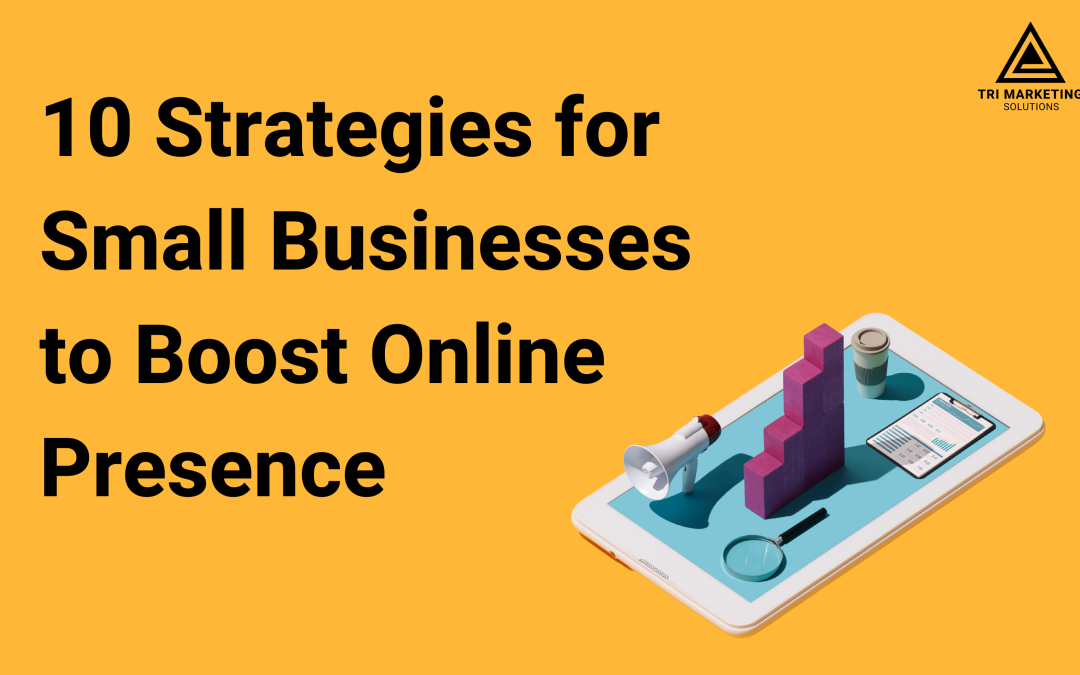In today’s digital age, having a strong online presence is crucial for the success of any small business. With an ever-increasing number of consumers turning to the internet to discover, research, and purchase products and services, small businesses must implement effective marketing strategies to stand out from the competition. Tri Marketing Solutions understands the challenges faced by small businesses, and that’s why we have compiled a list of 10 proven marketing strategies to help boost your online presence and reach your target audience effectively.
1. Develop a Well-Optimized Website
Your website serves as the virtual storefront for your business. Ensure that it is well-designed, user-friendly, and optimized for search engines (SEO). Focus on fast loading times, mobile responsiveness, and intuitive navigation to provide a positive user experience. By implementing SEO best practices, your website will rank higher on search engine results pages (SERPs), leading to increased organic traffic.
2. Create Engaging Content
Content is the backbone of any successful digital marketing strategy. Produce high-quality, relevant, and valuable content in various formats such as blog posts, videos, infographics, and social media posts. Engaging content not only attracts your target audience but also encourages them to share it, leading to greater visibility and brand exposure.
3. Leverage Social Media Marketing
Social media platforms offer a powerful avenue for small businesses to connect with their audience directly. Identify the social media channels where your target audience is most active and create a consistent presence there. Engage with your followers, respond to comments and messages promptly, and share your content across platforms to amplify your reach.
4. Utilize Email Marketing
Email marketing remains one of the most effective ways to nurture leads and retain customers. Build an email list by offering valuable incentives such as newsletters, discounts, or free resources. Send personalized and targeted emails that cater to the specific needs and interests of your subscribers. Remember to avoid excessive promotional content and focus on building relationships with your audience.
5. Implement Pay-Per-Click (PPC) Advertising
PPC advertising allows you to target potential customers directly through search engines and social media platforms. With a carefully crafted PPC campaign, you can drive highly relevant traffic to your website and increase conversions. Set a budget, identify relevant keywords, and continuously optimize your ads for the best results.
6. Collaborate with Influencers
Influencer marketing can be a game-changer for small businesses seeking to expand their online presence. Partner with influencers who align with your brand and have a significant following in your niche. Influencers can help introduce your products or services to a wider audience and build trust among potential customers.
7. Offer Online Giveaways and Contests
Hosting online giveaways and contests can generate excitement around your brand and encourage engagement with your audience. Encourage participants to share the contest with their friends and followers, expanding your reach exponentially. Offering attractive prizes or exclusive discounts will motivate users to participate and increase the chances of your campaign going viral.
8. Focus on Local SEO
If your small business operates locally, optimizing for local SEO is essential. Claim and optimize your Google My Business listing, ensure consistent NAP (Name, Address, Phone number) information across online directories, and encourage customer reviews. Local SEO efforts can significantly boost your visibility in local search results and drive foot traffic to your physical store.
9. Engage with Online Communities
Participate in online forums, social media groups, and industry-specific communities where your target audience is active. Offer valuable insights, answer questions, and provide helpful resources without being overly promotional. Building your authority within these communities can attract new customers and improve your online reputation.
10. Monitor and Analyze Performance
Regularly monitor the performance of your marketing efforts using analytics tools. Track website traffic, social media engagement, email open rates, and conversion rates. Analyzing data will help you identify what strategies are working well and where improvements are needed. Use this data-driven approach to refine your marketing strategies continuously.
Conclusion
Building a strong online presence requires a combination of creativity, consistency, and data-driven decision-making. As a small business, it’s essential to prioritize these proven marketing strategies to effectively reach your target audience, engage with potential customers, and ultimately boost your online presence. At Tri Marketing Solutions, we are committed to helping small businesses thrive in the digital landscape. By implementing these strategies and staying adaptable to the ever-changing marketing landscape, you can position your business for success in the competitive online world.

